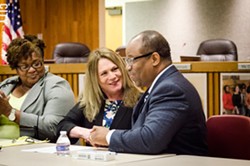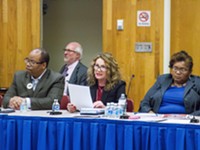Tuesday, November 29, 2016
New RCSD superintendent breaks her silence
Posted By Tim Louis Macaluso on Tue, Nov 29, 2016 at 11:54 AM
[UPDATED AND REVISED 12/2/16] Superintendent Barbara Deane-Williams acknowledged that the Rochester school district’s special education program is a mess at a meeting yesterday with about 300 members of the Rochester Teachers Association.
The city school district's new superintendent laid out what she’s learned after speaking to more than 1,000 district employees and community leaders – what her office has called her 100-day listening tour.
But she was met by more than a little cynicism; we've been here before, and everyone in the room knew it.
Deane-Williams said that she will stress innovation and customization to improve the district's graduation rate, which hovers around 50 percent. Staff at every level needs to strive for coherence so that their actions support what others are doing; fragmentation is a problem in the district, Deane-Williams said.
Many teachers applauded when she spoke about cutting through the bureaucracy that clogs the district’s ability to get things done quickly and efficiently. But she also said there will be greater accountability.
Deane-Williams is big on design thinking, which refers to a collective approach to creativity and problem- solving. And she said she wants to corral the mountains of data that the district collects.
“There are layers and layers of it,” she said. She wants central office to step up analysis of all that data so it can guide teachers and administrators in real time.
Deane-Williams gives the impression that she knows her way around the classroom and that she’s going to be a hands-on supervisor. School chiefs, her first line of direct reports, will spend about 80 percent of their time in schools, she said. She’s also created what she calls a "principal's cabinet," which gives her direct access to principals, who she intends to be much more instruction-driven and not just building managers.
She didn’t shy away from tough questions: old turnips that never seem to get tilled under. She’s acutely aware that some ineffective building administrators have been shuffled around instead of eased out. She’s not going to address the reconfiguration of grades, particularly how seventh and eighth graders are placed with elementary students in some schools. Facilities modernization, which is now in its second multimillion-dollar phase, has already accommodated the changes, she said.
How grades are supervised is far more important than how they are stacked in a building, she said — a response that drew some groans.
Deane-Williams doesn’t support social promotion, a process that some teachers say is why they end up with students in upper grades with reading proficiency below third grade. The practice corrupts the entire system, from graduation rates to their professional evaluations, they say.
There are two ways to tackle the problem, Deane-Williams said. One is through what she calls "kitchen-table tutoring" with students who need extra coaching in reading or math. The tutoring can be done by non-professionals the same way that parents do with their own children, she said.
Perhaps the biggest challenge facing the district is how to allocate resources to provide the specialist services for more seriously challenged students. For instance, adding reading teachers will require going through the budget line by line and “stopping something else,” because there’s no reason to expect increases in revenue, Deane-Williams said. That will be a difficult and public process, but she won't cut music or art programs to find those extra dollars, she said.
A brief online survey that audience members took on their cell phones revealed another issue many teachers still see as a problem: student behavior and school climate.
Still, Deane-Williams sees a district where the work and innovation taking place don't match the public’s negative perception of city schools. She asked: Why isn't the public aware of the many good things happening in city schools?
It’s a simple question that deserves an answer.
Deane-Williams made the acknowledgement in response to one of several questions posed by an RTA member.
The city school district's new superintendent laid out what she’s learned after speaking to more than 1,000 district employees and community leaders – what her office has called her 100-day listening tour.
But she was met by more than a little cynicism; we've been here before, and everyone in the room knew it.
Deane-Williams said that she will stress innovation and customization to improve the district's graduation rate, which hovers around 50 percent. Staff at every level needs to strive for coherence so that their actions support what others are doing; fragmentation is a problem in the district, Deane-Williams said.
Many teachers applauded when she spoke about cutting through the bureaucracy that clogs the district’s ability to get things done quickly and efficiently. But she also said there will be greater accountability.
Deane-Williams is big on design thinking, which refers to a collective approach to creativity and problem- solving. And she said she wants to corral the mountains of data that the district collects.
“There are layers and layers of it,” she said. She wants central office to step up analysis of all that data so it can guide teachers and administrators in real time.
Deane-Williams gives the impression that she knows her way around the classroom and that she’s going to be a hands-on supervisor. School chiefs, her first line of direct reports, will spend about 80 percent of their time in schools, she said. She’s also created what she calls a "principal's cabinet," which gives her direct access to principals, who she intends to be much more instruction-driven and not just building managers.
She didn’t shy away from tough questions: old turnips that never seem to get tilled under. She’s acutely aware that some ineffective building administrators have been shuffled around instead of eased out. She’s not going to address the reconfiguration of grades, particularly how seventh and eighth graders are placed with elementary students in some schools. Facilities modernization, which is now in its second multimillion-dollar phase, has already accommodated the changes, she said.
How grades are supervised is far more important than how they are stacked in a building, she said — a response that drew some groans.
Deane-Williams doesn’t support social promotion, a process that some teachers say is why they end up with students in upper grades with reading proficiency below third grade. The practice corrupts the entire system, from graduation rates to their professional evaluations, they say.
There are two ways to tackle the problem, Deane-Williams said. One is through what she calls "kitchen-table tutoring" with students who need extra coaching in reading or math. The tutoring can be done by non-professionals the same way that parents do with their own children, she said.
Perhaps the biggest challenge facing the district is how to allocate resources to provide the specialist services for more seriously challenged students. For instance, adding reading teachers will require going through the budget line by line and “stopping something else,” because there’s no reason to expect increases in revenue, Deane-Williams said. That will be a difficult and public process, but she won't cut music or art programs to find those extra dollars, she said.
A brief online survey that audience members took on their cell phones revealed another issue many teachers still see as a problem: student behavior and school climate.
Still, Deane-Williams sees a district where the work and innovation taking place don't match the public’s negative perception of city schools. She asked: Why isn't the public aware of the many good things happening in city schools?
It’s a simple question that deserves an answer.
Deane-Williams made the acknowledgement in response to one of several questions posed by an RTA member.
Latest in News Blog
More by Tim Louis Macaluso
-

RCSD financial crisis builds
Sep 23, 2019 -

RCSD facing spending concerns
Sep 20, 2019 -

Education forum tomorrow night for downtown residents
Sep 17, 2019 - More »


